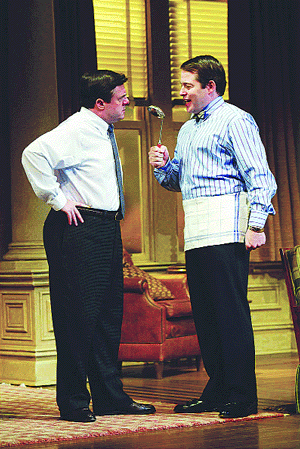Volume 4, Number 48 | December 1 – 7, 2005
THEATER
The Odd Couple
Brooks Atkinson Theatre
256 W. 47th St.
Tue.-Sat. 8 p.m.;
Wed., Sat. 2 p.m.; Sun. 3 p.m.
$60-$100; 212-307-4100
From a marketing perspective, Nathan Lane as Oscar Madison and Matthew Broderick as Felix Unger in “The Odd Couple” give command performances, but there’s nothing here you will see that is new..
Odd Men Out
When reviews simply don’t mean a thing
Unless you are very well connected or willing to pay through the nose, in all probability you are not going to see Nathan Lane and Matthew Broderick in “The Odd Couple.” Famously sold out since the sale of tickets was announced, reviews are virtually irrelevant—which is why this space has been allotted to such astonishing achievements as “See What I Wanna See” and “Sweeney Todd” nearly a month after the opening of the Neil Simon revival.
Yet this is not to invalidate the production, for it has two simple reasons to be. The first is to make money—buckets of money. The second is to give audiences exactly what they want—or think they want—so that the first goal can be achieved. It’s working. Better still, despite generally bland reviews, the ability for audience members to say they have seen the show becomes a special kind of social currency, so it really matters very little what appears on the stage. It is not the play, but the cultural event that is important. Think of it in the same vein as consumers who scored a Tickle Me Elmo in 1996, paying thousands for a $25 stuffed animal that sounded maniacally demented.
There is no tenet more established in the theater than “give ‘em what they want,” and I am all for the profit motive, but the result is a very specific kind of theater that is best appreciated as commerce rather than art. Among the real beneficiaries are the many charities lucky enough to leverage the demand to sell blocks of tickets and generate needed revenue on the desire to see this show. When all is said and done, few Broadway productions have done so much for so many non-profits just by showing up.
And, as H.L. Mencken famously said, “No one ever went broke underestimating American taste,” so these “Odd Couple” guys clearly know what they are doing. Personally, I’ll take the artistry of “Sweeney Todd” or the courage of “Beowulf” at the Irish Rep any day over this. Yet “Sweeney,” even at its highly promoted reduced budget, may not recoup its investment, and the Irish Rep is non-profit.
And, as packaging and marketing go, “The Odd Couple” is brilliant theater.
One can’t blame Matthew Broderick for turning in the exact performance he’s already done in “The Producers,” and “How to Succeed in Business Without Really Trying.” He has made the dweeby, whiny guy his stock-in-trade. It’s no different than any of the great character actors. That’s the performance people pay to see, and if it doesn’t quite fit the play, so be it. Though Broderick still maintains his ample personal charm, what is lost in his Felix Unger is the character’s masculinity.
As the play is written, Felix has come to a crisis—his wife has thrown him out and his world is collapsing. Sure he’s annoying, but Felix is in love with his family and with a depth that would have seemed more awkward and unusual to an audience in 1964 when the dominant, distant male stereotype of the Eisenhower era had yet to give way to the more touchy-feely dad. Director Joe Montello has directed Broderick to play up the quirks and abandon the man, and for all the comedy, the performance is hollow.
Nathan Lane, on the other hand, takes on the broad, vulgar stereotype of the guy alone without a feminine influence. Lane is completely in his element, and though you’ve seen this performance from him a thousand times, his innate appeal and always-impeccable timing make his trademark shtick a comfortable and welcome friend. I vastly preferred him in “Dedication, Or The Stuff of Dreams” earlier this season as he really pushed himself to find a new style of character and humanity, but that was a very different assignment.
What doesn’t work for a contemporary audience is the relationship between the two men. It’s nobody’s fault; time has simply passed this play by. Two men living together is not unusual. The juxtaposition of anal-retentive fussiness and chaotic sloppiness has been done to death. The clash of gender roles simply isn’t funny anymore. Charming though it is—particularly in the performances by Brad Garrett as Murray the Cop, Lee Wilkof as Vinnie, and Olivia d’Abo and Jessica Stone as the Pigeon sisters—the play ultimately seems as unreal as an eight-room apartment on the Upper West Side renting for a few hundred dollars a month. That world is gone for good—along with the stereotypes that made it more predictable—and recapturing it eludes director Montello and his stars.
In the final analysis, producers know stars are bankable. From Richard Burbage to the Divine Sarah, to Broderick and Lane, sometimes simply being in the same theater with them is enough to sell seats. Sometimes, for the greater good, it has to be.
gaycitynews.com



































